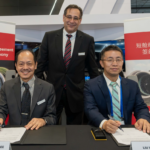The UK Space Agency has allocated $4.4m (£3.5m) towards developing capabilities to help ensure the space environment is exploited sustainably, a market which could be worth nearly $14bn globally by 2031.
The package includes a $2.5m (£2m) upgrade to the Satellite Applications Catapult’s In-Orbit Servicing and Manufacturing (IOSM) facility at the Westcott Space Cluster in Aylesbury. The facility will provide unique capabilities in the UK where companies can verify, validate and demonstrate a range of in-orbit operations including manufacturing, servicing, inspection, repair and assembly.
In addition almost $1.9m (£1.5m) is going into feasibility studies on the as-yet untested capability of refuelling satellites in space, to extend their life and reduce the amount of space debris.
There are today around 37,000 pieces of space debris in orbit measuring more than 10cm, and an estimated one million pieces sized 1-10cm. Debris – everything from defunct satellites and used rocket bodies to fragments left from collisions or fuel tank explosions – represents a catastrophic risk to spacecraft. The problem is getting worse as the number of missions launched annually increases.
The UK’s IOSM facility at the Westcott Space Cluster will become the first in the UK capable of verification, validation and demonstration of in-orbit operations.
Lucy Edge, chief operating officer at the Satellite Applications Catapult, which owns the IOSM facility, said: “IOSM is predicted to be worth $14bn globally by 2031, and the UK has the expertise to capture at least 25% of this market. To achieve that, it’s critical that the UK’s IOSM companies have access to infrastructure to test their technologies and operations under mission conditions.”
Separately, three new refuelling feasibility studies will support the UK’s efforts to lead on space sustainability by demonstrating the ability to refuel the planned UK national debris removal mission and explore opportunities for refuelling a commercial satellite.
Contracts have been awarded to Astroscale, ClearSpace and Orbit Fab for refuelling research.
As a company, Orbit Fab’s principal objective is refuelling. For the UKSA study, Astroscale and ClearSpace will adapt debris-removal spacecraft concepts to refuelling capability.
Subscribe to the FINN weekly newsletter

